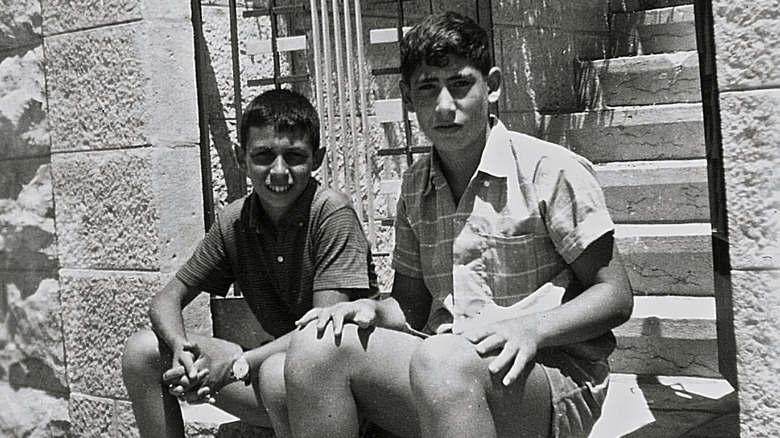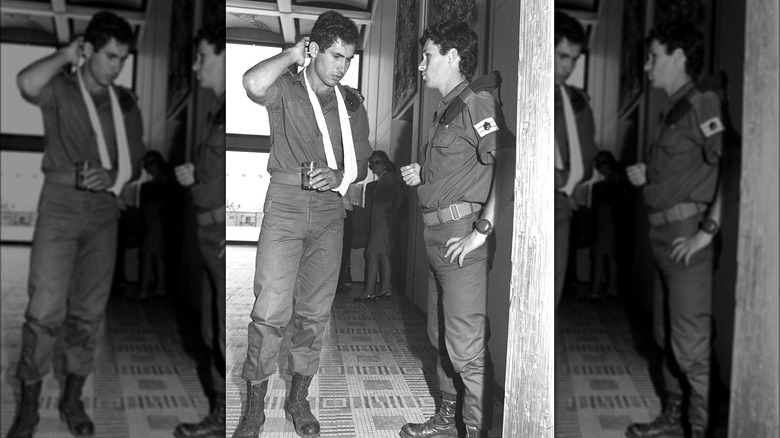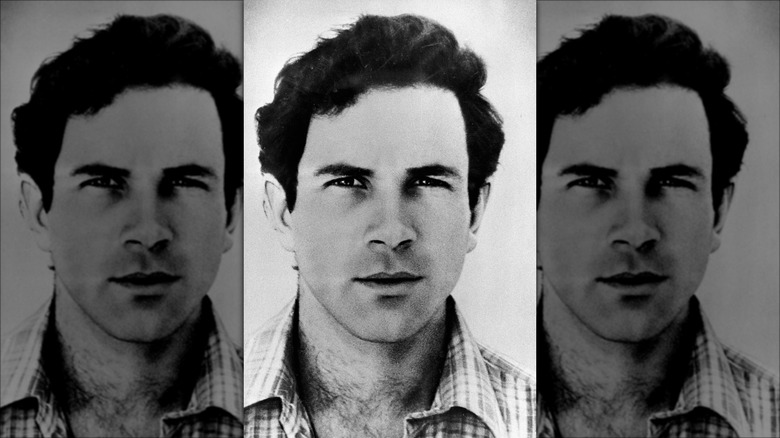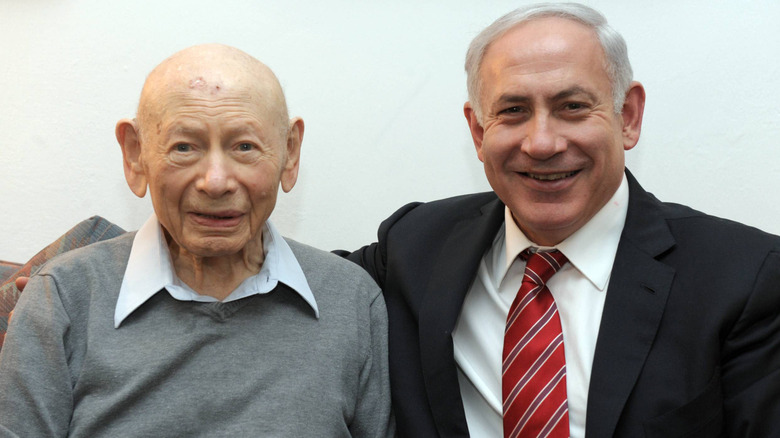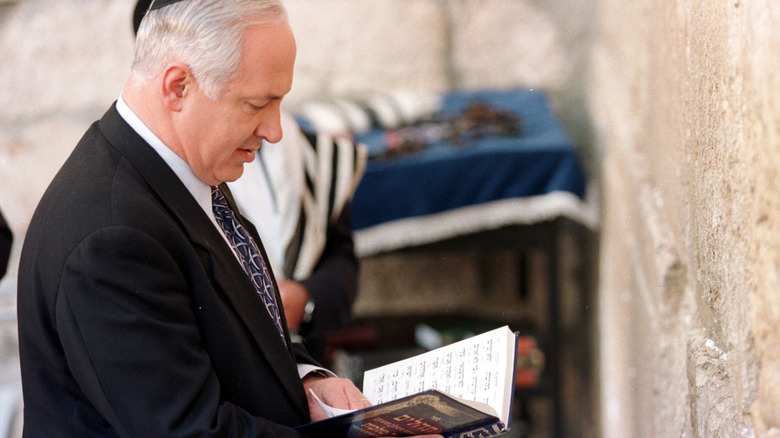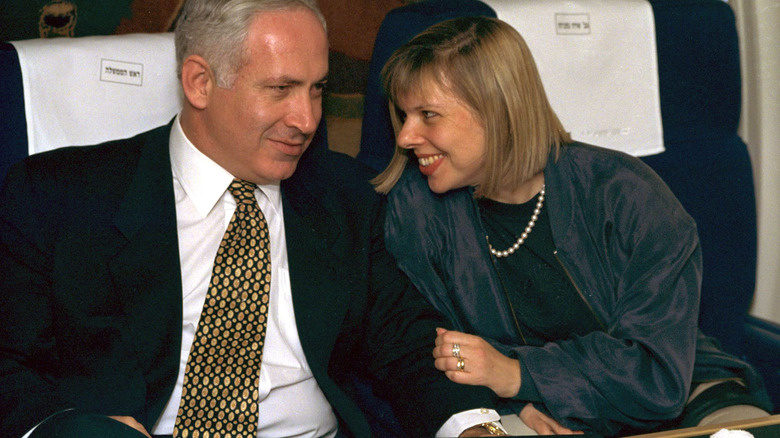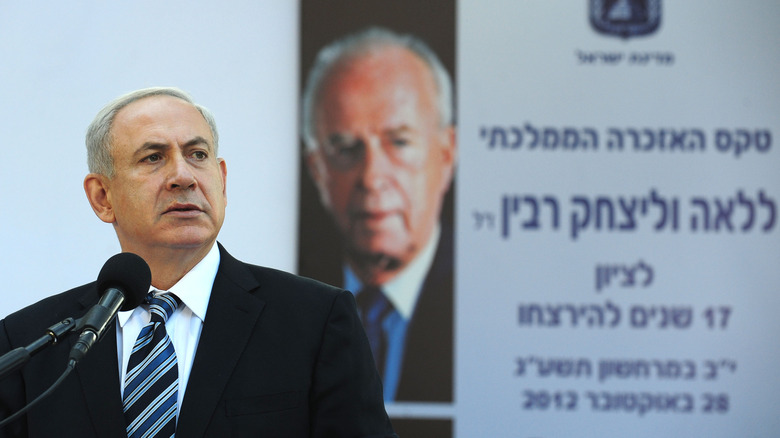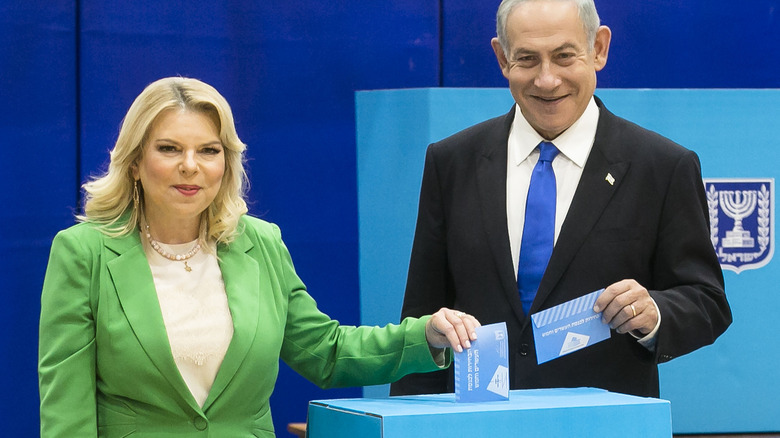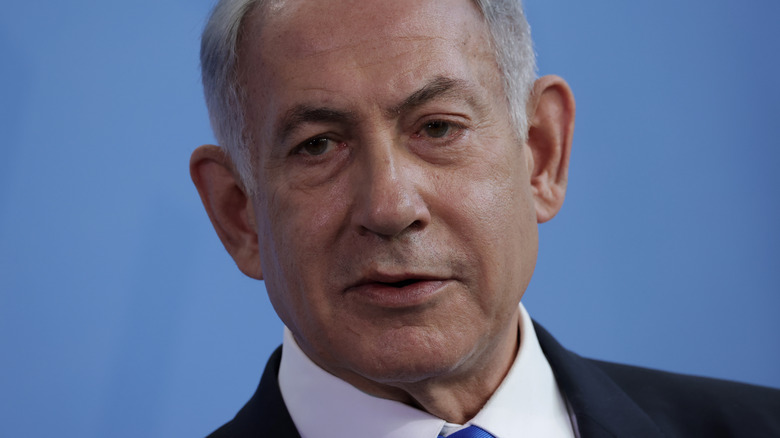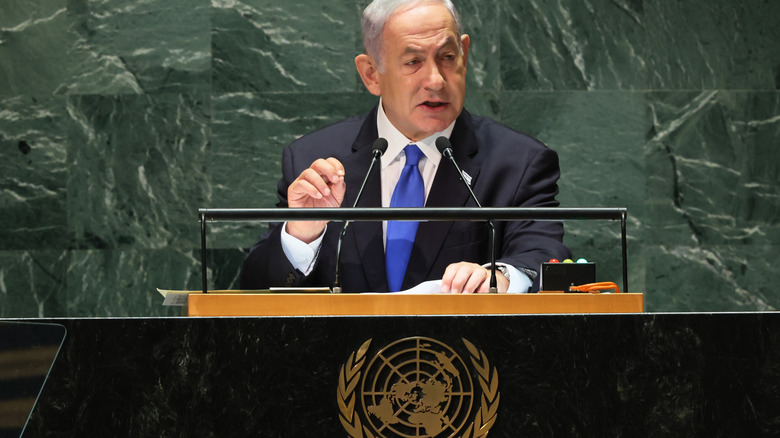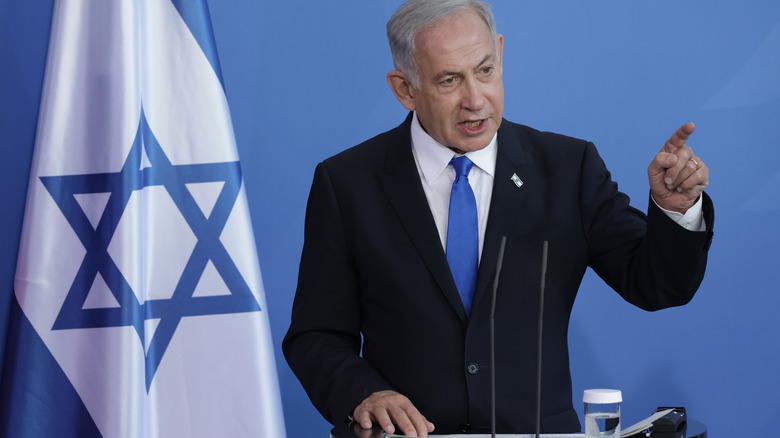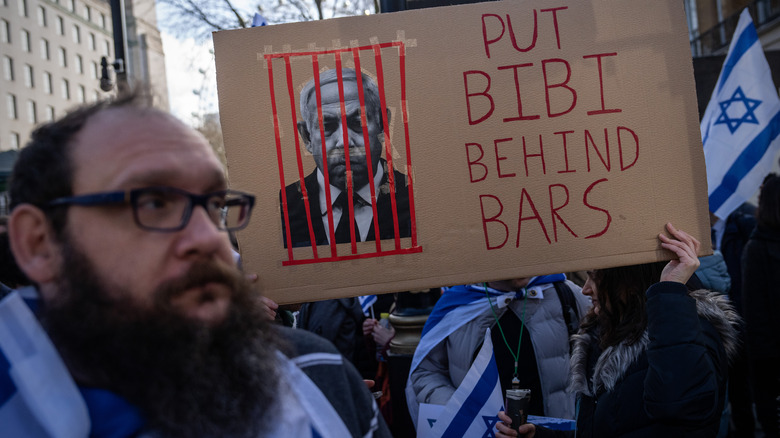The Untold Truth Of Benjamin Netanyahu
Political leaders are, by their very nature, controversial; no one will agree with everything they do. Now, throw in the decades-long conflict between Israel and Palestine, and using the term "controversial" ends up being a massive understatement. Several months before the declaration of war, the BBC described Benjamin Netanyahu as "politically invincible," citing his falls from grace, his comebacks, and his reelections — all of which have made him the longest-serving prime minister in Israeli history.
Supporters call him "King Bibi," and his time in power has been defined by a few crucial policies that include warnings about the continued persecution of Israeli Jews and the imminent danger presented by the policies of Iran. Not all of Israel has been 100% behind him at any given time ... until, says CNN, the unprecedented 2023 attack by Hamas and the declaration of war.
That, they say, unified Israel in a way that hadn't happened in a long time, but it's more a matter of having more important things to worry about. Yohanan Plesner, the president of the Israel Democracy Institute and a major in the Israeli special forces, explained, "The last thing Israelis care about right now is Netanyahu's political career." Still, it was Netanyahu who declared war with these chilling words (via PBS): "The enemy will pay an unprecedented price. [Israel will] return fire of magnitude that the enemy has not known." So, what is it that the rest of the world doesn't know about the man leading Israel to war?
He spent some of his formative years in Philadelphia
Listen to Israel's Benjamin Netanyahu (right) speak, and he sounds distinctly... well, American. There's actually a good reason for that, which is that he spent a good part of his teenage years in Philadelphia.
While Netanyahu doesn't exactly keep his Philadelphia years a secret, he doesn't really talk too much about them, either... which, to be fair, is how a lot of people deal with their high school years. He and his brother, Yonathan, moved to the city when their father started teaching college at what's now the Katz Center for Advanced Judaic Studies, and a letter his brother wrote shows just how out-of-place they felt. Yonathan described their school as having "about 1,500 students who don't know what they're doing here," and while he said the school, their neighborhood, and their home were very nice, he added that it was an "empty, meaningless life."
The Washington Post tracked down some of his old classmates, who gave some insight into what he was like. Deborah Lefco described him as being firmly opposed to the counter-counterculture, saying, "It was the Vietnam era and we were all against the war in Vietnam because we were kids. He was the lone voice in the wilderness in support of the conservative line in those days." Others remembered him as friendly but serious, a member of the chess club and soccer team, and emotionally much older and much more cynical than his years.
He was shot by the same bullet that injured a hijacker
The yearbook editor for his class at Cheltenham High School said (via The Washington Post) that Benjamin Netanyahu didn't go to his 1967 graduation ceremony: Immediately after high school, he headed back to Israel to start his service with the Israeli Defense Forces. Five years later, he was front and center during a headline-making rescue mission involving the hijacked Sabena flight 571.
Four members of the terrorist group Black September took control of Flight 571, forced the pilot to land at what's now Ben Gurion airport, and threatened to kill all on board unless 315 Israeli-held, Palestinian prisoners (who had been convicted on various terrorism charges) were released. The mission put together to retake the plane was called Operation Isotope, and involved Israeli commandos disguised as mechanics and technicians, who got close and then stormed the plane. In the end, two of the four hijackers were killed, along with one passenger. Two more were injured, and Netanyahu was shot.
Just what happened in those moments is rarely retold, but was shared in The Guardian around the release of an Israeli docudrama of the hijacking. Netanyahu was restraining one of the hijackers — 18-year-old Theresa Halsa, who would survive to receive a 220-year prison sentence and an early release in 1983 — when another one of the Israeli commandos hit her with his gun, causing it to discharge. The bullet went through Halsa, then through Netanyahu's arm.
[Image by IDF Spokesperson's Unit via Wikimedia Commons | Cropped and scaled | CC BY-SA 3.0 DEED]
He may have had an entirely different life, if not for his brother's death
For some, politics is a calling. For Benjamin Netanyahu, that surprisingly wasn't the case, and in 2021, he explained to Newsweek, "I thought I would be either in the academic world or the business world. My brother's death changed my life and directed it to its present course. It didn't shape my worldview. It reaffirmed it."
Yonathan (pictured) and Benjamin Netanyahu actually worked together in 1972: They were both a part of the commando team that was sent in to try to save the civilians on Sabena Flight 571 when it was attacked by Black September terrorists. (Benjamin would later recall his brother scolding him after he was shot: "He said, 'You see, I told you that you shouldn't have gone!'") Four years later, Yonathan led the Sayeret Matkal commando unit into Uganda's Entebbe airport and was tasked with freeing another group of hostages. Yonathan and three hostages were among the casualties — along with 45 Ugandan soldiers.
Although the incident has been celebrated as a monumental moment in Israeli history, it's also been condemned by critics who say the deaths of the Ugandan soldiers tend to be overlooked. What's not debated is that Yonathan's death not only pushed Benjamin to establish an antiterrorism agency in his name but rerouted his life's path to politics.
His father's extreme beliefs have continued to shape history through him
Benjamin Netanyahu has always taken a very definite stance on subjects like Palestine, and according to Carnegie Europe nonresident senior fellow Judy Dempsey, those beliefs have long been shaped by his father, Benzion Netanyahu. The elder Netanyahu — who preferred to be known as B. Netanyahu — was an Ashkenazi Jew who was one of the earliest residents of the post-war state of Israel, but with the arrival of Middle Eastern (Sephardic) Jews, a deep division formed within the state.
In addition to being firmly entrenched on the side at odds with the culture of Sephardic Jews, B. Netanyahu found himself on the outs with his own people as well. Dempsey says that's because he researched and wrote a highly controversial history of the Spanish Inquisition, in which he put forward the idea that most of the Jews who converted to Catholicism did so voluntarily and that the entire chapter of Spanish history had more to do with economics than religion.
Dempsey further wrote that "Jews, so B. Netanyahu believed, will always be subject to some kind of racism." Those views have long been reflected in his son's words, and she quotes him as speaking of conflict with Iran in dire terms that echo his father's teachings: "We are very simply in danger of extermination today. Not just existential danger but truly in danger of extermination. They think the extermination, the Holocaust, is over. It isn't. It goes on all the time."
The Likud Prince that no one in Israel liked
By the time Hamas' attack on Israel kick-started a 2023 war, Benjamin Netanyahu had been in power for so long that it was easy to overlook the fact that he had initially made his appearance on the national stage to quite a bit of skepticism and even more distaste. In his biography "The Resistible Rise of Benjamin Netanyahu," Neill Lochery explained that Netanyahu was one of the so-called "Likud Princes." In a nutshell, they were the nepo babies of the political world, in power because of their high-profile parents.
Even so, his initial forays into the public eye weren't met with overwhelming success. Lochery says that Netanyahu was a deputy minister regularly featured on CNN, and it was during one of those regular features that something extraordinary happened. It was the early 1990s, Israel was a prime target of Saddam Hussein, and Netanyahu was giving an interview when alarms sounded. He donned a gas mask and continued, saying of the shrieking alarms, "What it does demonstrate in a dramatic way is the threat that we are facing — and we would like to see that threat removed."
And it was almost shockingly polarizing. Lochery says that even though the West was captivated by the drama, "In Israel, much of the Hebrew press mocked Netanyahu's style. All drama and no substance was the general consensus among Israeli journalists." Leading politicians agreed, but one thing that couldn't be argued with was Netanyahu's massive international popularity.
He was caught up in a blackmail scandal
Neill Lochery's biography "The Resistible Rise of Benjamin Netanyahu" looks at scores of reasons why he was perhaps the unlikeliest candidate for being Israel's longest-serving prime minister, but perhaps one of the most fascinating is a blackmail scandal that unfolded in 1993. That's when he went on television to say that he was being blackmailed by a member of his own party, who accused him of cheating on his wife, Sara. The blackmailer — who Netanyahu named as Daniel Levy — had apparently told him that unless he removed himself from the running for Likud leadership, he'd go public with the affair. So, Netanyahu opted to just do it himself.
The whole thing ended up being wildly chaotic: Newspapers confirmed the identity of the woman he'd been having an affair with, political experts put forward the opinion that if he'd had such a panicked response to a little blackmail, he wasn't capable of serious leadership, and the public was fascinated by the whole thing. In spite of worries that the revelation would lose him the vote of the ultra-religious, he ended up winning by a massive margin.
There's a fascinating footnote to this. According to the Jewish Telegraphic Agency, Levy's camp said the whole thing was "a gimmick," with one person saying, "Why did Netanyahu choose today to publish the threat? Because he knows he is lagging behind Levy in the race, and wants to elicit sympathy."
Accusations he was involved in an assassination still linger
In 1995, Israeli Prime Minister Yitzhak Rabin was shot and killed at a peace rally. The events unfolded as he stepped off the stage after speaking to somewhere around 100,000 people, and came face-to-face with 25-year-old Yigal Amir. Amir, says The Guardian, shot the prime minister twice, and even stranger, he got what he wanted: an end to the Israel-Palestine peace talks.
The assassination was, of course, a big deal, and "The Resistible Rise of Benjamin Netanyahu" biographer Neill Lochery calls it Israel's "Kennedy moment." He also goes on to call it "Netanyahu's most decisive and his darkest moment," and here's why.
A 2016 PBS documentary took a look at the incident and said that Netanyahu became the most high-profile voice in the right-wing opposition to the peace talks. As such, he was the one blamed for fanning the fires which boiled over and led to the assassination: It seemed so clear-cut that even Rabin's widow publicly condemned Netanyahu for his words and his actions — which included participating in a rally where Rabin was called every name in the book, including "Nazi." Netanyahu's supporters, meanwhile, called the accusations nothing more than propaganda.
His wife has been at the center of a lot of scandals
Benjamin Netanyahu hasn't been the only member of his family to make headlines, and in 2017, The New York Times reported that his wife, Sara, was being charged with fraud in a case that saw her being accused of spending somewhere in the neighborhood of $100,000 of public funds on personal expenses. Specifically, meals: The charges alleged that she had ordered hundreds of meals that were charged to state accounts.
In 2019, NBC News reported that she agreed to a plea deal that included a $12,490 repayment and a $2,775 fine. That wasn't the end of her troubles, though, and around the announcement of the fraud charges was another bombshell.
According to a 2018 report by The New York Times, Sara was facing a third lawsuit from a former employee alleging they were abused while working for her. Shira Raban said (via The Times of Israel) that she was not allowed to take sick leave, not allowed to use the bathroom in the house, couldn't drink or eat while cleaning, and was told that she was expected to "run" while working: Raban quoted Sara as saying, "That's why I don't hire fat women." Raban claimed that she feared for her life and fled after a month, and although the Netanyahus denied all the claims, a recorded telephone conversation of Sara screaming at a publicist lent credence to former staffers' claims.
The connections he drew between Palestine and Hitler were incredibly controversial
First, a little bit of background, courtesy of the United States Holocaust Memorial Museum. They explain that Muhammad Amin al-Husayni was a religious leader of Palestine until 1937, and was exiled during the years around World War II. They also say that he spread pro-Axis propaganda in the hope of getting on their good side with the end goal of establishing a "pan-Arab, Muslim entity."
Fast forward to 2015, and Benjamin Netanyahu's speech at the Zionist Congress. That's where he claimed that it was al-Husayni who had given Hitler the ideas of the so-called Final Solution, saying, "Hitler didn't want to exterminate the Jews at the time, he wanted to expel the Jews." Netanyahu went on to claim that it was only after al-Husayni told Hitler that he didn't want the Jewish people fleeing to Palestine that Hitler decided to take his advice and kill them instead.
The comments got almost immediate condemnation, with sentiments perhaps best summed up by Hebrew University's German history professor Moshe Zimmermann, who said (via The New York Times) that not only was it wrong, but "With this, Netanyahu joins a long line of people that we would call Holocaust deniers." Why? The comments negate long-held facts stating that al-Husayni only met with Hitler after the gas chambers at the concentration camps went into use, and Saeb Erekat of the Palestine Liberation Organization explained that the comments "completely absolved Adolf Hitler's heinous and reprehensible genocide of the Jewish people."
Long-standing health issues were only revealed in 2023
Plenty of people have tried to broker peace between Israel and Palestine, including John Kerry. In 2013, Kerry headed up some talks that ended pretty abruptly when Benjamin Netanyahu, after calling for a break in the proceedings, simply announced that he was done talking, Israel wasn't going to accept the deal, and added that he had suddenly taken ill and the meeting was completely over.
According to The New York Times, they had tracked down multiple people who said that Netanyahu had a tendency to suddenly develop undisclosed health issues when the going got tough. It wasn't until 2023 that the Associated Press reported (via PBS) that for years, Netanyahu had been suffering from a chronic heart condition that had finally necessitated emergency surgery to implant a pacemaker.
He was met with widespread condemnation for a few reasons, with one simply being that a prime minister with a health condition that could potentially end in cardiac arrest might not be the best person to be in a high-stress position like the prime minister of Israel. And the other? Eliad Shraga of the Movement for Quality Governance in Israel explained, "This is a disaster: The doctors knew about his medical condition and lied to the people."
Questions around corruption go back decades
Benjamin Netanyahu and his allies swept through the 2022 elections for a government majority, and what made that really surprising was the fact that he was facing felony corruption charges at the time of his campaign and win.
Back in 2016, accusations surfaced that implied Netanyahu had been selling political favors in exchange for high-value gifts. Two years later, investigators advised that there was enough evidence to formally charge him, in what became known as Case 1000, Case 2000, and Case 4000. The three cases involved — respectively — a Hollywood producer, the publisher of a major Israeli newspaper, and a telecom giant who had allegedly worked out mutually beneficial deals with Netanyahu, going as far back as 2007. At the time of the election, The New York Times reported that Netanyahu was denying all charges, claiming it was proof of a long-standing conspiracy against him, and that trials had been continuously postponed.
Jump ahead a bit to 2023, when The New York Times did a little more digging into Netanyahu and his history. They found that when he and his then-wife Fleur Cates first lived in Tel Aviv, they secured digs via John Gandel, an Australian billionaire who handed over the keys to his seafront apartment. They say it was one of a long line of rich friends, and quoted one former associate as saying, "He was a person who walked around without a wallet."
It's being pointed out that for years, his policies benefited Hamas
After Hamas' 2023 terrorist attack on Israel, Israel's government put aside their differences and declared that in no uncertain terms, retribution was going to be swift. It even prompted U.S. President Joe Biden to step in with a reminder to everyone involved that the Geneva Convention was still a thing, but according to The Times of Israel, it was not only a long time coming, but they condemned Benjamin Netanyahu for creating the environment that allowed Hamas to flourish in the first place.
They cited a slew of political decisions, from allowing cash to flow into Gaza from outside sources to issuing scores of permits that allowed citizens of Gaza to work in Israel. They also accused "Netanyahu-led governments [of] practically turn[ing] a blind eye to the incendiary balloons and rocket fire from Gaza," and viewing Hamas as an ally with a shared end goal of not allowing the advancement of the Palestinian state.
There were even accusations that Netanyahu had ignored warnings that Hamas was planning to attack, but his denials proved to be of little comfort to the people of Israel. According to the Financial Times, 45% of Israelis feared for their personal safety just a week into the war, with even more — 70% — fearing for their nation.

